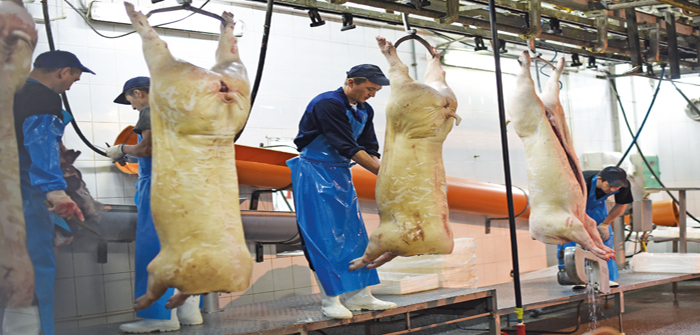Shane McAuliffe’s family produces 50,000 pigs per year for the Truly Irish brand. He is secretary of the Irish Pig Health Society, secretary of the Irish branch of the European Pig Producers and sits on the Irish Farmers’ Association’s National Pig and Pigmeat committee. He also works part-time as international swine business manager for Easyfix
‘Ar mhuin na muice’ is an old Irish saying which translates as ‘On the Pig’s Back’. It means that things are going very well. All current signs show that Irish pig farmers will be on the pig’s back this year.
Prices have recently held steady at €1.96/kg (£1.65/kg), and this is despite the fall in prices seen on the continent. This should hold into February when demand from Asian buyers is forecast to pick up. Teagasc, the Irish agri-food body, expects the average pig price for 2020 to be €2.15/kg (£1.81/kg).
The Irish food board Bord Bia’s figures show that the value of Irish pigmeat exports hit a record breaking €941 million in 2019.
The international market grew by 7% and accounted for 29% of exports. The UK and EU markets both saw a 3% drop back to 53% and 18% respectively. Demand from China for Irish pigmeat shot up from €73m in 2018 to €115m, with a record-breaking 82,000 tonnes of Irish pigmeat imported.
At home, domestic consumption performed well in 2019, averaging 27.9kg per capita. Pork purchases at retail level were back 3.6%, but rashers recorded a 0.6% growth.
Many farmers are reinvesting on the back of this uplift, addressing priorities that they just haven’t been able to work on due to the prolonged period of poor prices. One improvement many have availed of is the Lean Principles Programme for Pig Farmers.
This collaboration between the Department of Agriculture, Food and the Marine, Bord Bia, Teagasc and Enterprise Ireland has seen Lean consultants visiting pig farms to share the principles of Lean manufacturing to achieve operational and efficiency improvements. We have just finished the project on one of our farms and will certainly be applying again for another farm under the 2020 rollout.
Antimicrobial use recording on Irish pig farms started in November. We can now input our antimicrobial usage data on the national AMU database, a requirement of the updated Bord Bia Pigmeat Assurance Scheme.
Other progressive developments in terms of health include a review of the National Salmonella Control Programme, which will take place this year, along with the introduction of the Pig HealthCheck database by Animal Health Ireland, which will record abattoir data.
As I write this, I hear news of an animal rights group occupying a free-range poultry farm in the UK. This follows a similar event in Northern Ireland a number of weeks ago.
Ireland goes to the polls for the General Election on February 8 and we are busy lobbying – the Irish Farmers Association has called on the new government to strengthen legislation and increase enforcement against such activists who deliberately disregard biosecurity measures and the welfare and property of animals. I recently attended the Banff Pork Seminar in Canada and sat in on an interesting session, which looked at how to manage events like these.
This is now a challenge we all potentially face and I am glad to say that the NPA’s Lizzie Wilson will address delegates at the Irish Pig Health Symposium about the work NPA has done on this issue.
I also appeared on RTE’s Ear to the Ground programme to discuss African swine fever. Our industry remains on high alert and we hope that people with backyard pigs tuned in. The pigs and owners we do not know about are always of concern. The authorities cannot issue these people documents on biosecurity and the dangers of feeding food waste.
If ASF was to hit Ireland, then we would not only fall off the pig’s back, we certainly wouldn’t be able to get back on.




